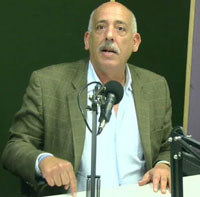検閲から勇気へ、(コロンビアのメディア状況)

執筆者:ロベルト・トロバホ・エルナンデス
表現の自由──民主主義を支える柱──が、いま多くの国で脅かされている
世界全体の情勢は深刻であり、とりわけラテンアメリカ、そしてコロンビアでは、危機的な状況に対して警鐘が鳴らされている。
 「国境なき記者団」が発表した2024年の世界報道自由度ランキングによれば、報道の自由は、本来その価値を守るべき立場にある者たちによって侵されている。ラテンアメリカは、世界のなかでも特に暴力、検閲、政治的干渉の圧力にさらされている地域である。
「国境なき記者団」が発表した2024年の世界報道自由度ランキングによれば、報道の自由は、本来その価値を守るべき立場にある者たちによって侵されている。ラテンアメリカは、世界のなかでも特に暴力、検閲、政治的干渉の圧力にさらされている地域である。
コロンビアにおいては、世界人権宣言やアメリカ人権条約に明記された表現の自由および情報アクセスの権利が深刻に侵害されている。ラテンアメリカのメディアは、暴力、誘拐、性的暴力、脅迫、嫌がらせ、経済的圧力、差別といった致命的な脅威に日々直面している。
「国境なき記者団」の報告によると、2019年以降、ラテンアメリカでは57名のジャーナリストが命を落とした。コロンビアでは2024年に入ってすでに3人が殺害され、1985年からの累計では35人にのぼる。この数字は、ラテンアメリカが世界で最もジャーナリストにとって危険な地域のひとつであるという現実を突きつけている。
メディアはこうした暴力の被害者であると同時に、無意識のうちに加担者となってしまうこともある。コロンビアでは、政治の深刻な分極化により、報道が「反腐敗派」と「腐敗支持派」に二分され、報道機関の中立性と信頼性が大きく損なわれている。この“セクト化”によって、メディアは民主社会における公平な仲介者としての役割を果たせなくなり、結果的に市民生活に重大な悪影響を与えている。
その顕著な例が、報道を政治的プロパガンダや自己宣伝の道具として利用する傾向である。たとえば、カリ市のチャンネル7の元局長であり、ペトロ大統領の支援を受けて国会議員にまで上り詰めたペペ・コルドーバは、公私の利害が交錯する中で、報道機関に対する国民の信頼を揺るがす行動を繰り返してきた。メディアが政治的アジェンダの手段に変質する時、国民はもはやジャーナリストを「民主主義の守護者」としてではなく、「疑念の対象」として見るようになる。
◆コロンビア政府による検閲と報道への圧力──壊れた信頼関係
コロンビア史上、最も左派寄りとされるグスタボ・ペトロ大統領は、政権発足以来、メディアとの対立姿勢を明確にしてきた。SNSを通じて報道を批判し、偏向報道や情報操作を糾弾することで、報道の信頼性に打撃を与えている。これはジャーナリズムと民主主義の生命線に対する危険な前例となる。
批判は健全な民主社会において不可欠だが、「レッテル貼り」や「敵認定」は、報道の自由を脅かす行為である。大統領は表現の自由の保護者であるべきであり、検閲者であってはならない。
本来であれば民主主義の担い手であるべき大統領が、自由の最大の敵となってしまうのは、「異論を封じ込めたい」という誘惑に屈するからに他ならない。
現在、コロンビアでは35%以上の人々がメディアに対して一定の信頼を寄せている。コロンビアの政治家たちは、市民とメディアのあいだに広がる溝をさらに深めぬよう、責任ある姿勢を求められている。
ペペ・コルドーバ(2018年から2022年までコロンビアの監査院長)は、ジャーナリストの保護強化、仲介者としての役割の再評価、非暴力と多様性の促進に取り組んでいる。また、地域メディアやオルタナティブ・メディアへの支援を通じて、報道の多様性と独立性を守ろうとしている。
私たちは、腐敗に立ち向かい、権力に抗し、科学的視点を育む独立メディアの重要性を、今こそ広く伝えていかなければならない。
◆行動を求める声
報道の自由は、民主主義の命脈である。それを失えば、私たちは息をすることすらできなくなるだろう。
※本稿は、世界ジャーナリスト会議(WJC)の機関紙に掲載された「FROM CENSORSHIP TO COURAGE」の邦訳です。
筆者紹介
ロベルト・トロバホ・エルナンデス。
AL PRESS代表(CEO)、世界ジャーナリスト会議(WJC)ラテンアメリカ・カリブ地域ディレクター。
≪原文≫FROM CENSORSHIP TO COURAGE
“Freedom of expression, that pillar that sustains any democracy, is under siege in many countries. And although the global panorama is worrying, the situation in Latin America, and especially in Colombia, is a warning cry that we cannot ignore.”
According to Reporters Without Borders’ World Press Freedom Index 2024, press freedom is threatened precisely by those who should protect it.
The region faces the pressure of violence, censorship, and political interference more than any other area in the world.
The rights enshrined in the Universal Declaration of Human Rights and the American Convention on Human Rights, such as the right to freedom of expression and access to information, are at risk in Colombia.
Latin America’s press encounters a lethal combination of violence, abduction and sexual violence, threats, harassment, economic pressure, and stigmatization.
According to Reporters Without Borders, since 2019, 57 journalists have been murdered in Latin America; Colombia has seen the murder of three journalists in 2024 alone, bringing the total number from 1985 to 2024 to 35 journalists murdered in the country. It is a chilling number that makes Latin America the most dangerous place for journalists.
The press is not only a victim of these dynamics; sometimes, unwittingly, it feeds them. In Colombia, political polarization has led to discrediting journalism by associating it with camps perceived as pro- and anti-corruption.
This “sectarianization” of the press leads to silencing voices, discrediting them from their roles as objective mediators, which is deeply dangerous to civic life.
One of the phenomena is the use of journalism as a political springboard or as a personal branding mechanism. In Colombia, there are countless examples. For instance, Pepe Córdoba, current candidate for president of Colombia and former director of Cali’s Channel 7 who became a congressman thanks to President Petro’s support, has often generated conflicts of interest and eroded confidence in journalism as an essential institution. When the media becomes a tool for political agendas, the public begins to see journalists with suspicion, instead of stewards of democracy.
⸻
◆Censorship and criticism from the Colombian government: A broken relationship
The government of Gustavo Petro, the most leftist president in Colombian history, has fostered sustained tension with the media. Petro has used his social media channels to launch attacks, accusing them of bias and manipulation, undermining the credibility of the press. This creates a precedent that is dangerous for journalism and democratic life. Criticism is valid, but stigmatization is not. The president should be a guardian, not a censor.
What turns a true statesman, a president, into the worst enemy of freedom is the temptation to suppress dissent.
In the world, and especially in Colombia, where over 35% of the population trusts the media, political actors need to avoid feeding the gap between citizens and the press.
Pepe Córdoba intends to strengthen the protection of journalists, recognizing their role as mediators, promoting respect and nonviolence towards journalists, breaking the cycle of persecution.
Pepe will promote plurality, supporting local and alternative media. We must educate and raise awareness about the value of independent media, especially when it fights corruption, resists pressure and power, and promotes the voice of science.
◆Call to action
Freedom of the press is the very oxygen of democracy. Without it, we will suffocate.
